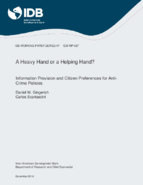A Heavy Hand or a Helping Hand? Information Provision and Citizen Preferences for Anti-Crime Policies
Date
Dec 2018
Journal version
Summary
Welfarist justifications of democracy presume that citizens have policy preferences that are responsive to pertinent information. Is this accurate? This paper addresses that question by providing a model and empirical test of how citizens’ policy preferences respond to information in the arena of anti-crime policy. The paper’s model shows that preferences for anti-crime policy hinge on expectations about the crime rate: in high crime regimes punitive policies are preferred, whereas in low crime regimes social policies are. To evaluate the model, the authors employ an information experiment embedded in the 2017 LAPOP survey conducted in Panama. The evidence is partially consistent with the paper’s theory. As expected, a high crime message induced stronger preferences in favor of punitive policies. Unanticipated by the paper’s theory, though, is the finding that a low crime message did not induce stronger preferences in favor of social policies. These findings raise the possibility that political communication about crime may have an inherent punitive policy bias.




